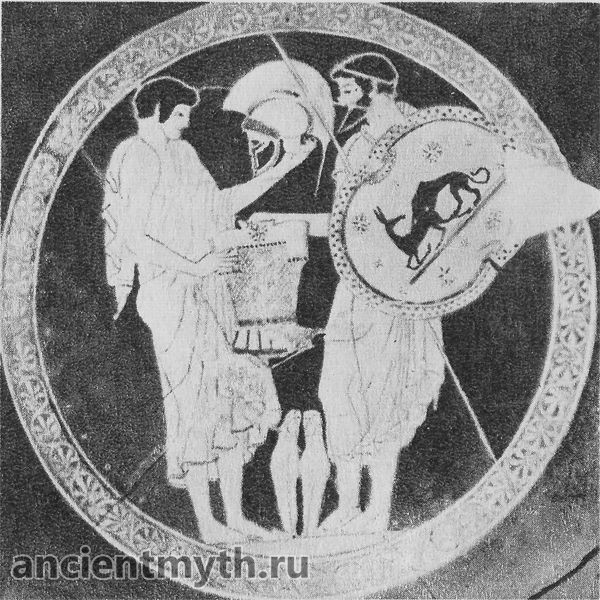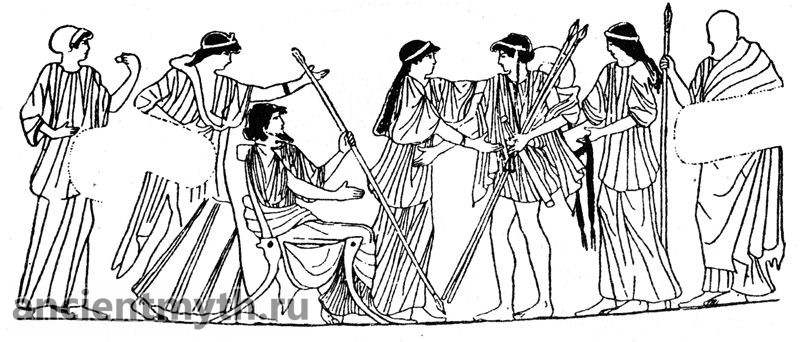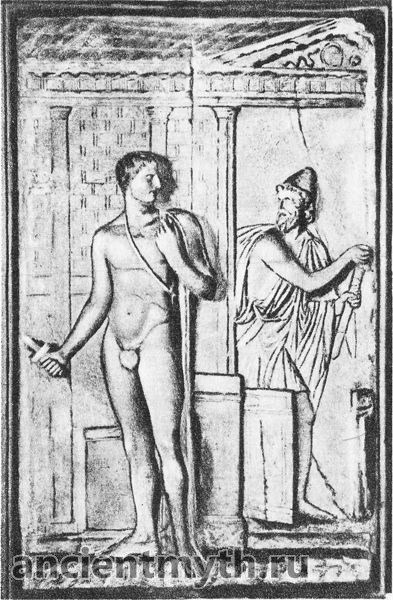Philoctetes. The last days of Troy.
After the death of Achilles and Ajax, the Greeks stubbornly continued the siege of Troy, but did not could take the city by force. Once Odysseus overheard from ambush the words of Helen, the son of Priam, and by cunning captured him. Thus, Odysseus found out that Troy would be taken only if Philoctetes arrived with poisoned arrows Hercules and the young son of Achilles Neoptolem. Odysseus immediately decided to go on a long journey for both heroes.

(Design on a vase.)
Odysseus had no difficulty when he arrived on the island of Skyros to the king Lycomedes, to convince the young son of Achilles to take part in the siege of Troy. Like his father, the beautiful Neoptolemus burned with a thirst for great deeds. He immediately set off on a journey with Odysseus, although his mother urged him to stay with tears Didamiya.
It was much more difficult to master Philoctetes. He lived on the desert island of Chrys near Lemnos, abandoned by everyone in a cave with two exits - to the east and to the west. Through these exits, the sun warmed the cave in winter, while the wind moderated the heat in it in summer. Philoctetes often experienced hunger. With difficulty he obtained his livelihood, killing wild pigeons with his arrows. The wound on his leg hurt terribly, the unfortunate man could hardly move to fetch water for himself. With great difficulty he managed to make a fire, striking stone on stone. Philoctetes experienced terrible hardships and sufferings on Chrys for ten whole years. From time to time sailors landed on the shores of Chrysa, but none of them agreed to take Philoctetes with them to Greece. The culprits of all these sufferings were the sons of Atreya and Odysseus. Philoctetes burned with terrible hatred towards them. He would gladly strike them down with the arrows of his bow.

Neoptolemos, holding two spears, stands in front of Lycomedes, who is seated in an armchair;
his mother Didamia is in front of Neoptolemus.
(Illustration on vase .)
Odysseus knew that imminent death threatened him if Philoctetes saw him; so he decided to master it by cunning. He persuaded the young Neoptolemus to go to Philoctetes and tell him that he was coming from under Troy, leaving the siege because the leaders of the Greeks offended him. If Philoctetes asks to be taken to Greece, then agree and in this way take possession of Philoctetes, his bow and arrows and take him to the ship. Then it will be easy to bring Philoctetes to Troy. Neoptolemus did not want to act by deceit, but Odysseus convinced him that only in this way could Philoctetes be lured to the ship. Neoptolemus agreed.
When the ship arrived at Chrys, Neoptolemus went ashore with several warriors and went to the cave. Philoctetes was not in it. Philoctetes soon appeared.
With a loud groan, he walked to the cave, terribly tormented by his wound. Philoctetes rejoiced when he saw the newcomers. Even more was his joy when he found out that he was facing Neoptoles, the son of Achilles. Neoptolemos told the sufferer the whole fictional story that Odysseus invented, told him about the death of Achilles, Patroclus< /a> and Ajax. Philoctetes was saddened when he learned about the death of those whom he loved more than all other heroes. Philoctetes agreed to sail with Neoptolemus to Greece; he even gave the young son of Achilles his arrows into a bow and prayed to protect him from the deceit of Odysseus. Philoctetes himself urged Neoptolemus to set sail for Greece as soon as possible.
Suddenly, a warrior arrives and reports that the hero Phoenix and the sons of Theseus are approaching to take Philoctetes to Troy by force. Despite the terrible suffering from which he falls unconscious to the ground, Philoctetes hurries to the shore. Sees these suffering Neoptolem. Unable to continue the deception, he reveals the whole truth to Philoctetes. Neoptolemus already wanted to return the arrows with the bow to Philoctetes, but Odysseus, who ran out of the ambush, did not allow him to do this. Philoctetes wanted to run and throw himself from the top of the cliff into the sea, just not to bean obedient tool in the hands of the hated Odysseus and the sons of Atreus. Odysseus ordered the servants to seize Philoctetes and force him to take him to the ship. Philoctetes fell into despair. Could not see his suffering Neoptolem and gave the bow and arrows to the unfortunate. The whole plan of Odysseus collapsed. He even hurried to flee, because he knew how terrible death from the arrow of Hercules.
He made another attempt by Neoptolem to persuade Philoctetes to go with him to Troad and help the Greeks take Troy. But Philoctetes flatly refused - he could not forget the sufferings that Agamemnon, Menelaus doomed him to and Odysseus. It seemed that they would have to leave Chrysa without reaching their goal, or again they would have to resort to deception by Neoptol.
Suddenly Hercules appeared in front of Philoctetes in the radiance of the immortal god. He ordered Philoctetes to go to the walls of Troy; there the greatest of the heroes promised Philoctetes healing from the wound and great glory in the capture of Troy. Philoctetes obeyed the will of his friend. Odysseus voluntarily boarded the ship of Odysseus and sailed to Troad, where his great deeds awaited. Neoptolemus performed many feats when he arrived under the walls of Troy. No one could compare in strength and courage with the son of Achilles. Many Trojan heroes fell at the hands of Neoptolemus in battle. He also killed in a fierce duel the mighty descendant of Hercules, Euripil, the son of Teleph. He was sent to help Priam by his mother, bribed with a precious gift - a golden vine, which Zeus< /a> for the beautiful Ganymede. After Memnon, the most powerful defender of Troy was beautiful as a god, Euripilus. His mother's greed ruined him.
Shortly after arriving at the walls of Troy, Philoctetes wounded Paris, the culprit of the entire war, with his arrow. Philoctetes inflicted an incurable wound on him with the poisoned arrow of Hercules, from which Paris had to die in terrible agony. The poison of the arrow penetrated deeper and deeper into his body. Paris left Troy for the forest and died there in terrible agony. He died where he once lived carelessly, like a simple shepherd. Shepherds found the body of Paris. They bitterly mourned the death of their former comrade.

(3rd century BC bas-relief)
They built a high fire, put the body of Paris on it and set it on fire. The shepherds collected the ashes, put them in an urn and put them in the grave.
Every day it became more and more difficult for the Trojans to defend the city. Still, the Greeks could not seize Troy by force. Then Odysseus decided on a dangerous feat. He disfigured his face with blows of a whip and, dressed in rags, under the guise of a beggar, went to Troy to find out everything that the Trojans were up to. All the Trojans saw the unfortunate beggar collecting alms along the crowded streets. Only Elena recognized Odysseus. Calling him into her house, Elena washed his body and swore not to reveal to the Trojans who he was. Odysseus found out everything and, having killed many guards, he safely returned to the camp of the Greeks. An even more dangerous feat was performed by Odysseus and Diomedes: they secretly entered Troy and crept into the sanctuary of Athens -Pallas; there stood a wooden image of the goddess, which had once fallen from the sky (palladium). This image had to be obtained by the Greeks, since as long as it was in Troy, it was impossible to take possession of Troy. With great danger, he was kidnapped by brave heroes. On the way back, they killed many Trojans and returned to the camp.